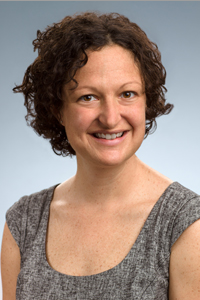Alumni Spotlight: Kate Konschnik

|
|
Reshaping the Environmental Policy Debate
In the fall of 1991, political science major and then sophomore Kate Konschnik (A’94) enrolled in EPIIC, that year on “International Security: The Environmental Dimension.” Little did she know that her decision to participate in this “intellectual boot camp” would lead her to pursue a career in environmental law and policy.
Konschnik, a graduate of Hastings College of the Law, has recently assumed a new position at Harvard Law School as Policy Director for the Environmental Law and Policy Program. Having spent much of her career working in the federal government—at the Department of Justice and the Senate—this transition to academia, she says, “took a bit of soul searching.”
As she explains, her move to Harvard Law School hinged less on where she is in her career path and more on the current status of environmental law and policy. She describes environmental issues as becoming more partisan, with both political parties at a standstill and often unable to agree on first principals. This divided approach motivated Konschnik to accept her new position at HLS.
“This is a great opportunity to take a step back from the fracas and think about a way to move forward…Energy issues are not going away any time soon. There is a general feeling that we need to retrench, see where we went wrong and come up with creative solutions.”
As the new Policy Director for Harvard Law School’s Environmental Law and Policy Program, Konschnik will be at the forefront of reshaping policy debates about this relatively new area of the law—an effort she calls “exploring environmental law 2.0.” The U.S. government enacted the first major federal environmental laws only in the 1970s, and forty years later the courts are still deciphering these statues. Harvard, searching for a candidate with environmental policy and litigation experience who had tested the laws in court, found a perfect match in Konschnik, who has served as a trial attorney in the Environmental and Natural Resources Division at the Department of Justice and Chief Environmental Counsel to Senator Whitehouse (D-RI).
Throughout her career, Konschnik has been involved in a series of important environmental policy debates addressing issues such as the 2010 Gulf of Mexico oil spill, carbon sequestration, and renewable energy. While working with Sen. Whitehouse, she defended the EPA’s Clean Air Act rulemaking and helped the Senator implement a National Endowment for the Oceans, Coasts, and Great Lakes as part of the Senate’s federal transportation bill.
Konschnik explains, the world is quickly evolving and changes in the market and advances in technology often have major effects on the environment, so Harvard Law School is making a concerted effort to engage with policy and lawmakers in Washington to play a more active role in this quickly evolving field. Much of Konschnik’s work at Harvard will involve determining the best ways to update environmental laws and design new enforcement approaches, all while “creating a nimble framework that allows humans to innovate.”
Konschnik says that her IGL experience has been formative in her career path. The skills imparted to her in the colloquium, including the ability to learn and understand the facts and contextualize an issue, have been invaluable in her career. During the 1992 colloquium “International Security: The Environmental Dimension,” Konschnik said she became aware of the critical linkages between the environment and political security when she conducted research on the Tuareg people in Mali, exploring the links between human, environmental and political security. In 1994, during her second year in EPIIC, which that year focused on “Ethnicity, Religion, and Nationalism,” Konschnik and a fellow EPIIC student were selected as the only two undergraduates who had the honor of presenting their research in Stockholm at the United Nations World Summit for Social Development. Konschnik’s substantive experience at the UN solidified her passion for environmental policy and helped convince her to pursue a career in the field.

